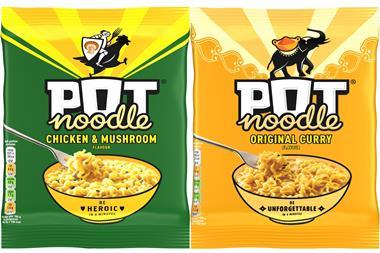>>when will suppliers get meaningful protection? Andrew George MP, Lib Dem Shadow Agriculture Secretary
The OFT proved again last week that, where supermarket power is concerned, it is a toothless, academic-style institution, capable only of circumnavigating the subject in perpetual inquiries without holding out hope of a meaningful solution.
Its report on the supermarkets code of practice was sadly typical of its approach to the continuing problem of supermarkets’ treatment of suppliers - it suggested that it needed more evidence and then would produce yet another report.
Some of the media have interpreted the latest findings as a clean bill of health for the supermarkets. But, implicitly and explicitly, the OFT has admitted the code doesn’t work. In what by OFT standards was forthright criticism, it pronounced that ‘by and large’ the supermarkets have complied with the code - civil servant speak for the fact they had not.
The audit found 44 breaches by the pre-merger Safeway and two further breaches by Sainsbury. Surely this is significant when the OFT audited only 500 relationships between suppliers and supermarkets. Particularly so, given the main supermarket that suppliers were prepared to report was the one that essentially no longer exists.
What was most disappointing was the emphasis the report placed on suppliers solving their own problems. The code can’t work if it’s not used, they were told. Suppliers must demand things in writing, they said.
But even the blinkered OFT knows that won’t happen - its own report in February 2004 uncovered that 73% of suppliers are too scared to come forward. The fact remains that supermarkets have suppliers by the short and curlies.
Don’t get me wrong, I don’t blame the supermarkets. Those who use their market muscle in their negotiations with farmers’ co-ops and suppliers are behaving rationally. Not doing so, when their competitors ratchet suppliers to the floor, would put them at a competitive disadvantage. The question is whether this is a justifiable use or an unacceptable abuse of power.
The code was drawn up by supermarkets, so it is hardly surprising it enshrines the imbalance of power in their favour. That situation will remain until the code is strengthened, removing where possible such vague terms as ‘reasonableness’.
The Liberal Democrats propose the creation of a Food Trade Inspector, within
the OFT, to proactively investigate unfair treatment in order to overcome suppliers’ fears. If the supermarkets have nothing to hide, I doubt they would have any reason to object. This is surely preferable to the voluntary creation of code compliance officers appointed by the supermarkets (as proposed by Tesco), which is like asking poachers to appoint their own gamekeeper, answerable only to poachers.
Consumers want reassurance that supermarkets’ claims can be backed up independently and that their purchases are not damaging the viability of British farming. Supermarkets would benefit from having their trading practices independently endorsed; while farmers would benefit from getting some reassurance that unfair pressure and alleged threatening practices could not be hidden under a more transparent environment and secure contractual arrangement.
The growing dominance of supermarkets in the c-store sector will only exacerbate the problems faced by suppliers.
The OFT will have to be much more open-minded and proactive if it is going to get to the bottom of this. I fear that, on the basis of its past performance, it does not have the stomach for the fight. That is a shame. The current climate means there is a golden opportunity to address the issue once and for all.
But I fear that if we end up with the code remaining unchanged and/or a similarly timid buyers’ charter being introduced, it could be another five to 10 years before suppliers get meaningful protection.
The OFT proved again last week that, where supermarket power is concerned, it is a toothless, academic-style institution, capable only of circumnavigating the subject in perpetual inquiries without holding out hope of a meaningful solution.
Its report on the supermarkets code of practice was sadly typical of its approach to the continuing problem of supermarkets’ treatment of suppliers - it suggested that it needed more evidence and then would produce yet another report.
Some of the media have interpreted the latest findings as a clean bill of health for the supermarkets. But, implicitly and explicitly, the OFT has admitted the code doesn’t work. In what by OFT standards was forthright criticism, it pronounced that ‘by and large’ the supermarkets have complied with the code - civil servant speak for the fact they had not.
The audit found 44 breaches by the pre-merger Safeway and two further breaches by Sainsbury. Surely this is significant when the OFT audited only 500 relationships between suppliers and supermarkets. Particularly so, given the main supermarket that suppliers were prepared to report was the one that essentially no longer exists.
What was most disappointing was the emphasis the report placed on suppliers solving their own problems. The code can’t work if it’s not used, they were told. Suppliers must demand things in writing, they said.
But even the blinkered OFT knows that won’t happen - its own report in February 2004 uncovered that 73% of suppliers are too scared to come forward. The fact remains that supermarkets have suppliers by the short and curlies.
Don’t get me wrong, I don’t blame the supermarkets. Those who use their market muscle in their negotiations with farmers’ co-ops and suppliers are behaving rationally. Not doing so, when their competitors ratchet suppliers to the floor, would put them at a competitive disadvantage. The question is whether this is a justifiable use or an unacceptable abuse of power.
The code was drawn up by supermarkets, so it is hardly surprising it enshrines the imbalance of power in their favour. That situation will remain until the code is strengthened, removing where possible such vague terms as ‘reasonableness’.
The Liberal Democrats propose the creation of a Food Trade Inspector, within
the OFT, to proactively investigate unfair treatment in order to overcome suppliers’ fears. If the supermarkets have nothing to hide, I doubt they would have any reason to object. This is surely preferable to the voluntary creation of code compliance officers appointed by the supermarkets (as proposed by Tesco), which is like asking poachers to appoint their own gamekeeper, answerable only to poachers.
Consumers want reassurance that supermarkets’ claims can be backed up independently and that their purchases are not damaging the viability of British farming. Supermarkets would benefit from having their trading practices independently endorsed; while farmers would benefit from getting some reassurance that unfair pressure and alleged threatening practices could not be hidden under a more transparent environment and secure contractual arrangement.
The growing dominance of supermarkets in the c-store sector will only exacerbate the problems faced by suppliers.
The OFT will have to be much more open-minded and proactive if it is going to get to the bottom of this. I fear that, on the basis of its past performance, it does not have the stomach for the fight. That is a shame. The current climate means there is a golden opportunity to address the issue once and for all.
But I fear that if we end up with the code remaining unchanged and/or a similarly timid buyers’ charter being introduced, it could be another five to 10 years before suppliers get meaningful protection.














No comments yet